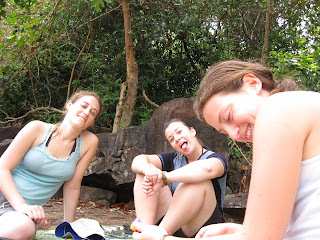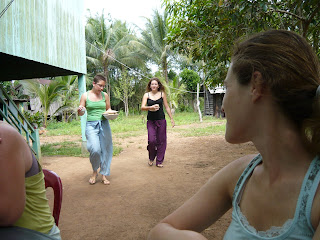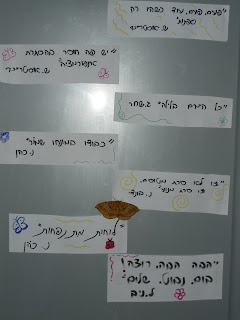For three weeks now we have been advertising the construction day of the new community center. We hung signs, handed out leaflets, talked to people. One week prior to the big day we held a community meeting. This, too, was advertised, and many people told us they would be there. Fifteen showed up. That’s 0.5%.
After that meeting some serious rethinking was done. It was crucial to figure out how we can obtain the cooperation and involvement of the community. How we could make them realize that all we are doing is for their benefit, and therefore they should be just as invested in it as we are, if not more. A plan was devised, a touchstone, to both encourage the community to participate, and get an indication of how willing they are to get on board. We would hand out letters specifying our plans for the future and our past achievements, and request the locals’ signature as an affirmation of their support and cooperation. All signed letters must be returned to a letter box in front of the community center no later than 11 AM the following day. If we do not receive at least 100 signed letters we will renounce all our plans and ambitions, and leave Chi Phat.
So we set out that night, going from house to house in all four villages, handing out letters to anyone who is old enough to participate in construction and explaining our intentions. In 3 hours we handed out 450 such letters. It was a final, almost desperate, effort. A last attempt to succeed where we have been unsuccessful for a month and a half.
That night, at midnight, Eshhar entered and showed us the two letters she had collected from the box – all that was yielded in four hours time. The doubt over the outcome of our mission and the quiet mourning that is innate in Israeli Memorial Day joined together to create a morose atmosphere in the house.
The next morning, at 7 AM, Shai collected 30 more letters from the box. Things were looking up, but since the Cambodians are early-risers, I figured that most of them had gone out to work already, and it’s unlikely that many more letters will turn up. With this notion, I set out to teach the first of my final English lessons. By the time I returned there were 59 letters. It was already past 9.
Gil and I went out to distribute some more letters – if we were going down, it would not be without a tenacious fight. We walked around Kamlot trying to gather up a few last desperate signatures. On the way we were joined by the 8th and 9th graders, who set out all of their own accord to remind people to sign. By 10 we were done, and headed back home.
We passed by the community center on the way and Gil asked, “should we look in the box?”. “Of course we should”, I answered, “anyway, it’s not as if we can help ourselves”. I took out eleven more letters. “That makes 70”, I said to her. With an hour to go. On the way home we met a young man who gave us another letter. 71, I felt the meter in my head ticking.
We approached the house just as Shai was coming out. “62”, he said as we passed him on our bikes. “Did he say 62?” My head was reeling to calculate the total “Shai!” I shouted after him, “62?”. He held up his hands to signal “9” and then “2”*, “ninety-two”. That’s not counting the twelve I was holding in my hand. I turned to Gil in astonishment and said, “we have a hundred”. “We have a hundred!”, to Eshhar who was sitting beneath our house. “We have a hundred”, to Nufar who arrived a few minutes later. “We have a hundred and five”, to the video camera which was used to document the count, to Shai, Lihi and Shani, to the translators, to the reforestation team, to the people waiting for answers back home. And the count just kept rising – 111... 116… 150… 167… 168… 188… 194. 194 votes of support, everyone. Happy Independence Day!!!
After that meeting some serious rethinking was done. It was crucial to figure out how we can obtain the cooperation and involvement of the community. How we could make them realize that all we are doing is for their benefit, and therefore they should be just as invested in it as we are, if not more. A plan was devised, a touchstone, to both encourage the community to participate, and get an indication of how willing they are to get on board. We would hand out letters specifying our plans for the future and our past achievements, and request the locals’ signature as an affirmation of their support and cooperation. All signed letters must be returned to a letter box in front of the community center no later than 11 AM the following day. If we do not receive at least 100 signed letters we will renounce all our plans and ambitions, and leave Chi Phat.
So we set out that night, going from house to house in all four villages, handing out letters to anyone who is old enough to participate in construction and explaining our intentions. In 3 hours we handed out 450 such letters. It was a final, almost desperate, effort. A last attempt to succeed where we have been unsuccessful for a month and a half.
That night, at midnight, Eshhar entered and showed us the two letters she had collected from the box – all that was yielded in four hours time. The doubt over the outcome of our mission and the quiet mourning that is innate in Israeli Memorial Day joined together to create a morose atmosphere in the house.
The next morning, at 7 AM, Shai collected 30 more letters from the box. Things were looking up, but since the Cambodians are early-risers, I figured that most of them had gone out to work already, and it’s unlikely that many more letters will turn up. With this notion, I set out to teach the first of my final English lessons. By the time I returned there were 59 letters. It was already past 9.
Gil and I went out to distribute some more letters – if we were going down, it would not be without a tenacious fight. We walked around Kamlot trying to gather up a few last desperate signatures. On the way we were joined by the 8th and 9th graders, who set out all of their own accord to remind people to sign. By 10 we were done, and headed back home.
We passed by the community center on the way and Gil asked, “should we look in the box?”. “Of course we should”, I answered, “anyway, it’s not as if we can help ourselves”. I took out eleven more letters. “That makes 70”, I said to her. With an hour to go. On the way home we met a young man who gave us another letter. 71, I felt the meter in my head ticking.
We approached the house just as Shai was coming out. “62”, he said as we passed him on our bikes. “Did he say 62?” My head was reeling to calculate the total “Shai!” I shouted after him, “62?”. He held up his hands to signal “9” and then “2”*, “ninety-two”. That’s not counting the twelve I was holding in my hand. I turned to Gil in astonishment and said, “we have a hundred”. “We have a hundred!”, to Eshhar who was sitting beneath our house. “We have a hundred”, to Nufar who arrived a few minutes later. “We have a hundred and five”, to the video camera which was used to document the count, to Shai, Lihi and Shani, to the translators, to the reforestation team, to the people waiting for answers back home. And the count just kept rising – 111... 116… 150… 167… 168… 188… 194. 194 votes of support, everyone. Happy Independence Day!!!

* “ninety” and “sixty” sound very similar in Hebrew.

.jpg)



















